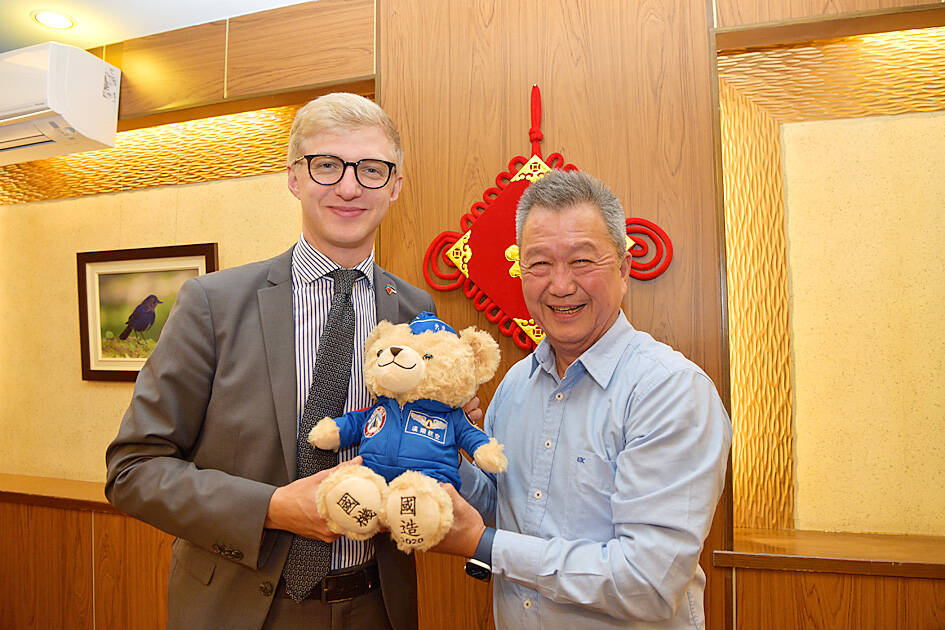Aerospace Industrial Development Corp (AIDC) on Friday received an Estonian delegation at its drone production line, with aspirations to deepen cooperation with the Baltic country.
The delegation was led by Estonian lawmaker Kristo Enn Vaga, chairman of the Estonia-Taiwan Support Group of the Parliament of Estonia, and included lawmaker and former minister of defense Kalle Laanet as well as representatives of several Estonian defense industry companies, Taiwan Excellence Drone International Business Opportunities Alliance (TEDIBOA) said in a news release on Saturday.
AIDC chairman Hu Kai-hung (胡開宏), who heads the drone alliance, said that Estonia is competitive in many fields, including digital technology, drone applications and defense technology.

Photo courtesy of the Aerospace Industrial Development Corp via CNA
Coupled with Taiwan’s drone supply chain, cooperation between the two countries would create synergy, he said.
The alliance said that while Estonia is far from Taiwan, the two countries share a similar experience in democratic development and therefore share ideas on the importance of constructing a democratic supply chain.
The TEDIBOA was established by the Ministry of Economic Affairs in September last year and has more than 160 members.
The alliance combines the specializations of each member and integrates the whole drone supply chain from upstream to downstream operations, with the goal of obtaining government-to-government orders, as well as constructing a domestic “non-red supply chain,” Hu said.
AIDC’s role in the alliance is counter-drone system development and to provide assistance on drone production, he said.
In an interview with local media on Wednesday, Vaga proposed closer cooperation between the Baltic state and Taiwan in defense technology, especially on drones.
If Taiwan chooses to work with Estonia, a member of the EU, it would also open the door for Taiwanese investments in the massive EU market, a relatively unfamiliar territory for Taiwan, he said.
Cooperation in drones could also help Taiwan deal with undersea cable damage incidents that have occurred over the past few years, a phenomenon also detected in Estonia, he said.
Last month, a Chinese-owned cargo vessel allegedly damaged an undersea cable near its northeastern coast in what is believed to be an act of sabotage.
Taiwan also reported undersea cable damage in February 2023 when two cables between Taiwan and the outlying Matsu islands were severed, with the Internet cut off for more than 50 days.
Although China has denied involvement in these incidents, they highlighted the vulnerability of the nation’s offshore communications infrastructure.
Similar incidents have also been reported in Estonia.
NATO has said it would enhance its military presence in the Baltic Sea, with Estonia sending a patrol ship to protect its Estlink1 undersea power cable, after Russia allegedly damaged its main power link in the Gulf of Finland in December last year. The Kremlin has denied involvement in the incident.
Vaga said his country is certain that at least some of the undersea cable incidents near Estonia and around Europe were acts of sabotage by Russia, although it could take more time and evidence to determine legal responsibility.
Democracies like Estonia and Taiwan need to be very decisive in countering such acts of sabotage, he said.
This is also where both sides can join forces including by using underwater drones as countermeasure or building underwater sensor networks as a defense.

Taiwanese can file complaints with the Tourism Administration to report travel agencies if their activities caused termination of a person’s citizenship, Mainland Affairs Council Minister Chiu Chui-cheng (邱垂正) said yesterday, after a podcaster highlighted a case in which a person’s citizenship was canceled for receiving a single-use Chinese passport to enter Russia. The council is aware of incidents in which people who signed up through Chinese travel agencies for tours of Russia were told they could obtain Russian visas and fast-track border clearance, Chiu told reporters on the sidelines of an event in Taipei. However, the travel agencies actually applied

Japanese footwear brand Onitsuka Tiger today issued a public apology and said it has suspended an employee amid allegations that the staff member discriminated against a Vietnamese customer at its Taipei 101 store. Posting on the social media platform Threads yesterday, a user said that an employee at the store said that “those shoes are very expensive” when her friend, who is a migrant worker from Vietnam, asked for assistance. The employee then ignored her until she asked again, to which she replied: "We don't have a size 37." The post had amassed nearly 26,000 likes and 916 comments as of this

New measures aimed at making Taiwan more attractive to foreign professionals came into effect this month, the National Development Council said yesterday. Among the changes, international students at Taiwanese universities would be able to work in Taiwan without a work permit in the two years after they graduate, explainer materials provided by the council said. In addition, foreign nationals who graduated from one of the world’s top 200 universities within the past five years can also apply for a two-year open work permit. Previously, those graduates would have needed to apply for a work permit using point-based criteria or have a Taiwanese company

The Shilin District Prosecutors’ Office yesterday indicted two Taiwanese and issued a wanted notice for Pete Liu (劉作虎), founder of Shenzhen-based smartphone manufacturer OnePlus Technology Co (萬普拉斯科技), for allegedly contravening the Act Governing Relations Between the People of the Taiwan Area and the Mainland Area (臺灣地區與大陸地區人民關係條例) by poaching 70 engineers in Taiwan. Liu allegedly traveled to Taiwan at the end of 2014 and met with a Taiwanese man surnamed Lin (林) to discuss establishing a mobile software research and development (R&D) team in Taiwan, prosecutors said. Without approval from the government, Lin, following Liu’s instructions, recruited more than 70 software